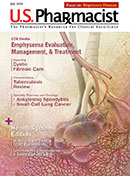In a recent publication in the journal Science Translational Medicine, researchers from the University of Houston, Frank McKeon, professor of biology and biochemistry and director of the Stem Cell Center, and Wa Xian, research associate professor at the center, employed single-cell cloning technologies to generate databases of basal stem cells from the lungs of 16 patients with IPF and 10 patients without the disease.
For this study, Houston Methodist Lung Transplant Center provided the lung tissue from patients who had transplants for end-stage lung disease, from which some of these basal cell clones were created. The basal cells were employed because single-cell RNA sequencing studies consistently identified lung basal cells in IPF.
In a press release, the authors stated, "We identified a major stem cell variant that was distinguished from normal stem cells by its ability to transform normal lung fibroblasts to pathogenic myofibroblasts in vitro and to activate and recruit myofibroblasts in clonal xenografts."
The researchers also indicated, "This profibrotic stem cell variant, which was shown to preexist in low quantities in normal and even fetal lungs, expressed a broad network of genes implicated in organ fibrosis and showed overlap in gene expression with abnormal epithelial signatures identified in previously published scRNA-seq studies of IPF."
Howard J. Huang, MD, medical director at Houston Methodist Lung Transplant Center, stated, "The study breaks new ground by showing lung fibrosis is driven by specific basal stem cell variants that become overly abundant in diseased lungs. Importantly, these variants are distinct from abnormal variants identified in other chronic lung diseases. These findings suggest therapies selectively targeting these pathogenic stem cell variants may ameliorate fibrotic lung disease progression."
The researchers also indicated that having a greater understanding of the manner in which these minor variants are differentially augmented in COPD, IPF, and perhaps other lung conditions will refine the specific risk factors for these diseases that affect the lungs.
Dr. Xian stated, "In this study, we applied the same single-cell cloning technology used to assess COPD to the lungs of patients with IPF. In contrast to the three pathogenic basal cell variants found to dominate the COPD lung, lungs with advanced IPF showed a major basal cell variant in addition to the normal distal airway stem cell. This IPF variant showed constitutive expression of proinflammatory and profibrotic genes and displayed the functional capacity to orchestrate the fibrotic state both in vitro and in vivo."
Dr. McKeon also stated, "Conversely, deciphering why these variants come to dominate the lung could aid in our ability to treat these conditions."
The content contained in this article is for informational purposes only. The content is not intended to be a substitute for professional advice. Reliance on any information provided in this article is solely at your own risk.
« Click here to return to Respiratory Update.
Published June 12, 2023





